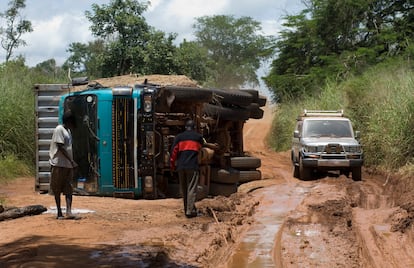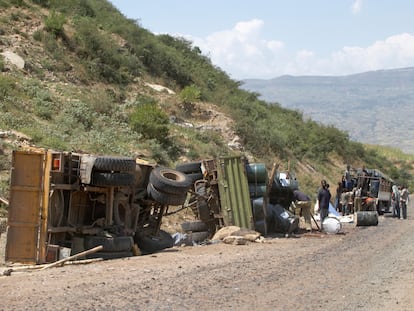Cars kill more people than wars in Africa: Traffic accidents claim a life every two minutes
A total of 259,061 people lost their lives in road accidents in the continent in 2021, according to the latest report from the Africa Transport Policy Program

Of every four people who die in a road accident worldwide, one is African. And the most recent death toll is the worst on record this century: an estimated 259,601 people died in 2021 as a result of a traffic incident, according to the State of Africa Road Safety Report 2025, recently published by the Africa Transport Policy Program (SSATP), an international alliance dedicated to road safety. In sub-Saharan Africa alone, fatalities have increased by 17% in the last decade. Road accidents on the continent are even more lethal than its armed conflicts: for example, they killed four times more people in one year than the first 14 months of war in Sudan, which, according to research, left 61,000 people dead.
The figure of 259,601 in the SSATP report is the most reliable available for Africa based on the latest country-by-country data published by the World Health Organization (WHO) and other sources, because not all states have up-to-date and accurate information on injuries and fatalities. Such a high number, warns the SSATP, poses “serious challenges” for public health and the continent’s development. When a person dies or is injured, it causes a country to incur healthcare costs, decreases productivity, and increases the risk of poverty for families. “Countries should understand that road deaths jeopardize their economies and development,” warns Binta Sako, technical officer of the WHO’s Violence-Related Injuries and Disability Unit in Africa, specializing in road safety issues, in a telephone interview with EL PAÍS.
It’s a continental tragedy of something that could have been avoided”Binta Sako, technical officer of the WHO’s Violence-Related Injuries and Disability Unit in Africa
Although, according to the SSATP, the continent has made progress and made commitments to reducing road accidents, there are still pending tasks, such as greater political will, building safe roads, stricter enforcement of laws, and securing funding for road safety programs.
Here are five key points from the report that illustrate why road accidents in Africa are a serious public health problem:
1. Africa has the highest traffic fatality rate in the world
Every two minutes, someone in Africa dies in a road accident, a preventable public health problem. Of those killed, 66% were aged between 18 and 59, meaning they were of productive age. “It’s a continental tragedy of something that could have been avoided,” warns Sako. The WHO expert points out that, although the global trend is toward a reduction in traffic fatalities, in sub-Saharan Africa the figures have risen 17% in the last decade.
The figure of 259,601 deaths in one year is, by comparison, 23 times higher than the mortality rate caused by Ebola in West Africa between 2014 and 2016, when more than 11,300 people died. It also represents the highest rate in the world: 19.6 deaths per 100,000 inhabitants on average, according to the SSATP report. In some countries, it is even worse, such as Guinea (37.4), Libya (34), Guinea-Bissau (30.7), or Zimbabwe (29.9), according to the latest WHO data. Outside Africa, only countries like Haiti (31.3) or Syria (29.9) have similar figures. In contrast, in Spain, the rate is 3.5.
Road accidents not only kill people, but also “pose a serious challenge to public health and development,” the SSATP tells this newspaper via email. “Injuries and deaths result in significant economic losses equivalent to 5% of a country’s GDP” and cause “decreased labor productivity, increased healthcare costs, and long-term setbacks to sustainable development and poverty reduction.”
2. There is little data
Officially, in 2021, 51 of Africa's 54 countries reported a combined total of 82,685 road traffic fatalities in one year. However, the WHO projects estimates using mathematical models that, in its most recent report, reveal the death toll to be three times higher. Having current, reliable, and highly disaggregated data is key to developing strategies to address road accidents.
Sako warns that in addition to not recording all deaths, in some countries there are not even accurate numbers of the injured, which worsens the situation for people left with some degree of disability, especially on a continent with few services focused on caring for people.
3. The total number of vehicles doubled between 2013 and 2021
Africa faces a paradox: it’s the continent with one of the lowest motorization rates on the planet (between 3% and 4%), but at the same time, it’s the region with the highest number of road deaths (24% of those killed are African). Sako explains that having fewer cars doesn’t necessarily mean less risk on the roads: “Rather, it’s a matter of insufficient regulations on imported vehicles.”
What worries experts is that the increase in the vehicle fleet is starting to take its toll now. “The total number of vehicles doubled between 2013 and 2021, while the number of two- and three-wheeled vehicles almost tripled in the 10 countries with available data,” explains the SSATP. Sako adds that the exact number of two- and three-wheeled vehicles is not yet known because it is a recent boom on the continent, for which countries have not agreed on a precise registration system. Much less, she adds, has the obligation to wear certified helmets been made stricter.
4. There are more road safety agencies, but a lack of funding
Africa has a growing number of state road safety agencies, but they are not receiving sufficient funding. “A total of 49 countries reported having national road safety agencies, but only 29 receive budget support,” says the SSATP, warning that limited and inconsistent funding hampers these agencies’ ability to operate effectively. “The limited budgetary commitment is due to a lack of political will,” the SSATP concludes. “This situation is exacerbated by a lack of technical and managerial capacity.”

5. Some laws and little enforcement
While African countries have some laws to ensure road safety, not all meet WHO standards, and few are rigorously enforced. For example, while 48 countries have regulations related to speed, one of the main risk factors on roads, only 45 establish penalties and only 41 specify how they should be enforced. States also lack insight into whether the regulations are working well, as only 13 countries have data on speed-related deaths and eight on speeding vehicles. The SSATP asserts that “urgent improvements” are needed to these laws, specifying how they are enforced, implementing robust monitoring systems, and strengthening victim care after crashes. “If not properly enforced, laws become symbolic,” the agency states.
In terms of infrastructure, of the 54 African countries, only 35 have safer road design standards aligned with international standards, and only nine states have laws requiring road safety assessments. The picture is no better regarding vehicle safety legislation. Only 33 countries have laws on car safety, and only one on two- and three-wheeled vehicles. None of the countries surveyed by the SSATP for its report specified whether they had specific safety standards for imported vehicles. This is alarming, adds WHO’s Sako, considering that Africa is the main destination for used vehicles in the world.
Regarding driver regulations, the SSATP notes that most African countries have comprehensive laws for only one of the five risk factors identified by the WHO: speed, alcohol, seatbelts, helmets, and transporting minors. No country has comprehensive laws for all five factors.
In terms of treaties, the continent is also not on the right track. Africa, for example, has had the African Road Safety Charter since 2016, which establishes commitments and strategies to reduce traffic fatalities. However, in practice, the charter is not implemented. Only 26 countries have signed it and barely 13 have ratified it: 15 more are needed for it to enter into force. At the end of February, at the Fourth Global Road Safety Conference in Morocco, Amani Abou-Zeid, African Union Commissioner for Infrastructure, criticized African leaders for this. “Don’t wait four more years for the next commissioner to come and ask you to raise your hand and find out which countries have signed and ratified and which haven’t,” the commissioner said. “How many times have you heard this morning that Africa has the highest rate of road insecurity and traffic fatalities? Didn’t that move you? We can’t just attend conferences that move us every three years; it should be one of our daily concerns.”
Sign up for our weekly newsletter to get more English-language news coverage from EL PAÍS USA Edition
Tu suscripción se está usando en otro dispositivo
¿Quieres añadir otro usuario a tu suscripción?
Si continúas leyendo en este dispositivo, no se podrá leer en el otro.
FlechaTu suscripción se está usando en otro dispositivo y solo puedes acceder a EL PAÍS desde un dispositivo a la vez.
Si quieres compartir tu cuenta, cambia tu suscripción a la modalidad Premium, así podrás añadir otro usuario. Cada uno accederá con su propia cuenta de email, lo que os permitirá personalizar vuestra experiencia en EL PAÍS.
¿Tienes una suscripción de empresa? Accede aquí para contratar más cuentas.
En el caso de no saber quién está usando tu cuenta, te recomendamos cambiar tu contraseña aquí.
Si decides continuar compartiendo tu cuenta, este mensaje se mostrará en tu dispositivo y en el de la otra persona que está usando tu cuenta de forma indefinida, afectando a tu experiencia de lectura. Puedes consultar aquí los términos y condiciones de la suscripción digital.









































